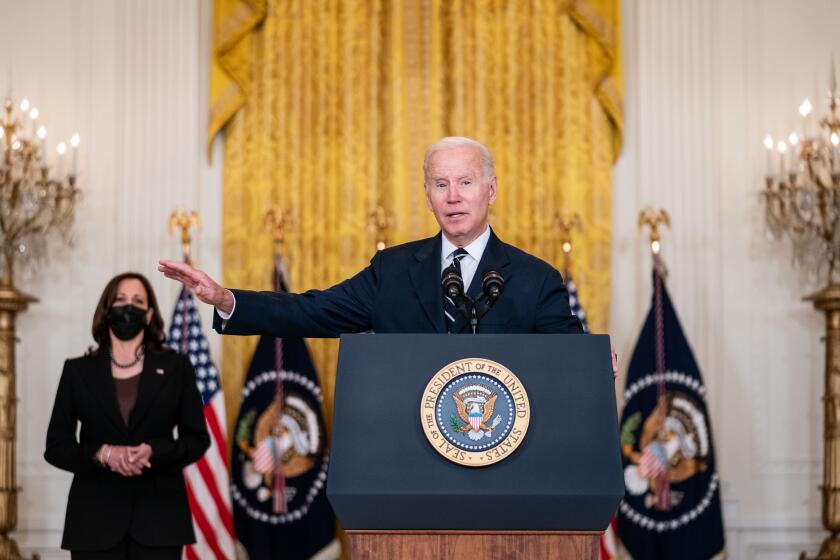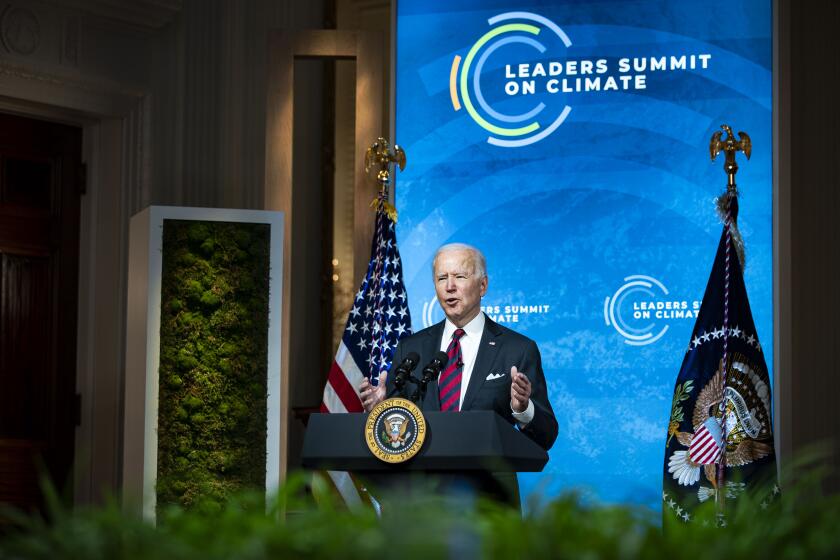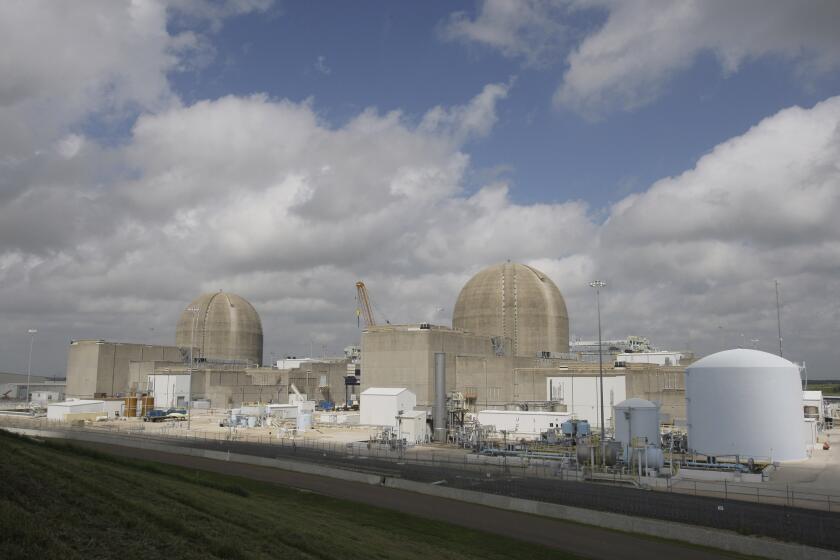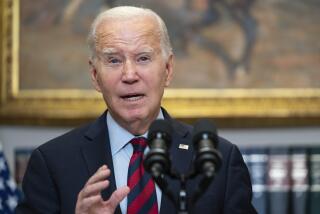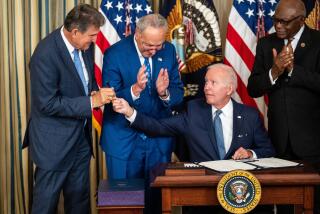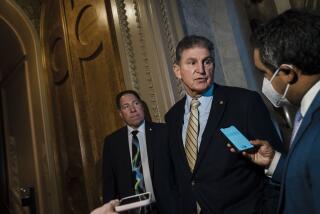Biden and Democrats unveil $1.85-trillion plan for social and climate change programs

- Share via
WASHINGTON — After months of negotiation, President Biden and Democratic leaders on Thursday released the framework of a $1.85-trillion bill that would reform the nation’s social programs and attempt to address the climate crisis.
But Democrats are still struggling to pull together the nearly unanimous party support needed to pass it.
Biden appeared on Capitol Hill to announce the framework, encouraging Democrats to end their bickering and support his chief legislative priority.
Hours before he left the country for back-to-back international summits, Biden laid out the political stakes for Congress, where Democrats have slim majorities in both houses heading into next year’s midterm election.
“I don’t think it’s hyperbole to say that the House and Senate majorities, and my presidency, will be determined by what happens in the next week,” Biden told House Democrats in the basement of the Capitol, according to a person familiar with the remarks.
This is what’s inside President Biden’s “Build Back Better” framework.
The proposed package would bring the most substantial expansion of the nation’s social safety net programs in decades, even though it is far less ambitious than the $3.5-trillion measure Democrats once envisioned.
It would provide universal preschool for 3- and 4-year-olds, delivering the first expansion of public education since high school was added.
The plan would establish subsidies for childcare, extend the child tax credit for one year and expand assistance under the Affordable Care Act. Medicaid would be expanded in states that chose not to do so under the 2010 law, also known as Obamacare.
Medicare would grow to include hearing coverage, a policy that is likely to be politically popular with seniors.
The climate policies, pegged at about $555 billion, have not yet been finalized but include a clean energy tax credit to spur uptake of rooftop solar, tax credits for electric vehicles and clean energy technology as well as the creation of a civilian climate corps for conservation efforts.
Under the plan, some immigrants in the country without legal status would be allowed to apply for work permits as long as they’ve been in the country for several years. The protection would be crucial for recipients of DACA, or Deferred Action for Childhood Arrivals, if the courts strike the program.
Missing from the framework — which Democrats said they expect to modify — are many progressive priorities. A path to citizenship for so-called Dreamers is gone, as are vision and dental benefits in Medicare. The bill does not lift the cap on state and local taxes, known as SALT.
Centrist Sen. Joe Manchin III of West Virginia essentially vetoed paid family and medical leave, as well as a climate program that would have encouraged utilities to increase their use of renewable energy through a combination of payments and fines.
The United States is going to Scotland with a patchwork plan that falls far short of what’s needed to prevent climate change devastation.
Arizona centrist Sen. Kyrsten Sinema’s opposition to Medicare negotiating prescription drug prices means that policy is out too, a significant blow for Democrats who have campaigned on the issue for 15 years.
Several Democrats said they would continue to lobby their colleagues on adding policy to the bill, particularly prescription drugs, lifting the SALT cap and paid family leave.
While the framework marked a potential breakthrough, it was no panacea for the distrust between Senate centrists and the House progressives who have held up a House vote on a separate bipartisan $1-trillion infrastructure bill. Together with the social spending plan, the two bills make up Biden’s legislative agenda.
Progressives have said they won’t support the infrastructure bill until they have a commitment that the Senate will pass the larger social spending bill. In the Thursday morning meeting, Biden and House leaders tried to persuade progressives to support a vote Thursday on the infrastructure bill, which was already approved by the Senate.
Speaker Nancy Pelosi (D-San Francisco) said she wanted the vote held by the time Biden lands in Rome at 8 p.m. Eastern time. “When the president gets off that plane, we want him to have a vote of confidence from this Congress,” she told Democrats.
But progressives held firm in their position. There are “too many no votes for the [infrastructure bill] to pass today,” said Congressional Progressive Caucus chairperson Rep. Pramila Jayapal (D-Wash.).
The House instead approve a stopgap measure to fund surface transportation through Dec. 3, which is likely to serve as the new deadline for final action on Biden’s bills.
There is no workable path to addressing global warming that does not include a substantial role for nuclear power.
Biden told House Democrats that he believed the social spending bill would get 50 Senate votes and enough support to get through the House, but that confidence did not convince them. Jayapal called it “a bit of a leap of faith.”
Progressives said they needed a commitment that Sinema and Machin would approve the social spending bill. In the 50-50 split Senate, their support will be essential.
Manchin and Sinema said in separate statements that they will continue to work on the plan, but expressed no guarantee to support it.
Biden’s visit to Capitol Hill represented a roll of the dice as he takes on a larger, public role in bringing negotiations to a close and moving toward final votes. Most of Biden’s work on the effort in recent weeks has been in one-on-one or small group meetings with pivotal lawmakers.
Stressing the message the bills would send to other countries after the Jan. 6 insurrection, he said, “the rest of the world wonders whether we can function.”
Thursday’s visit marks the second time House Democrats have rebuffed the president’s in-person request to vote on the infrastructure bill, the first coming at the end of September.
Several policies in the bill are expected to change in the coming days. Immigration provisions could be among the most tenuous.
Governments’ failure to take aggressive action looms large as leaders head to the COP26 climate summit, billed as ‘the last, best chance’ to save Earth.
The framework would grant benefits to some immigrants in the U.S. without legal status. It would prevent deportation and give people the ability to apply for a work permit as long as they have been in the country for a set number of years, possibly a decade, according to people familiar with the plan.
Protection would be granted for five years and would be renewable for another five, Sen. Robert Menendez (D-N.J.) said.
Menendez said he is confident the plan would meet Senate rules, although the parliamentarian has not yet approved the policy. The Senate’s rule keeper has said that prior attempts to establish a path to citizenship as part of the bill violated Senate rules.
While it is far short of Democrats’ hopes to enact a pathway to citizenship as part of the plan, it marks the “biggest step forward in decades,” said Todd Schulte, president of the immigration advocacy group FWD.us.
Another policy area that needs more definition is climate. The proposed climate policies consist of a series of grants, tax credits and targeted incentives totaling $555 billion.
However, some have questioned whether it is enough to achieve Biden’s goal of halving emissions from 2005 levels by 2030.
“I don’t think it’s enough in terms of what we have to do to rapidly pivot to renewable energy,” Sen. Jeff Merkley (D-Ore.) said.
Sen. Sheldon Whitehouse (D-R.I.) said he wants to see evidence in the form of modeling to make a decision on whether the policies would reduce emissions. “We want to see modeling,” he said.
Times staff writer Chris Megerian contributed to this report.
More to Read
Get the L.A. Times Politics newsletter
Deeply reported insights into legislation, politics and policy from Sacramento, Washington and beyond. In your inbox three times per week.
You may occasionally receive promotional content from the Los Angeles Times.
